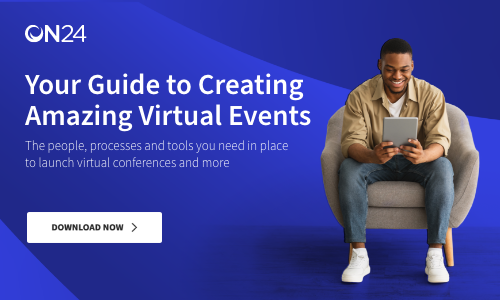Step-by-Step Guide: How to Host Virtual Events Successfully

Virtual events provide businesses with a convenient way to connect with audiences across and deliver valuable, engaging content. They also provide businesses with valuable audience insights based on first-party and engagement data.
But running a successful virtual event takes planning and a deep understanding of how to use the tools you have available to you efficiently.
We created this guide to hosting virtual events to show you how it’s done. In it, we cover the basics of virtual events, plot out a step-by-step guide on hosting, and explain how you can ensure your virtual event makes a measurable impact.
What Is a Virtual Event?

As a concept, a virtual event describes any situation where remote participants log onto a platform to participate in an organized activity online. Often, the term “virtual event” is used as a synonym for webinars and virtual conferences.
But virtual events can be more. As an umbrella term, it can encompass industry conferences, product workshops, symposiums, town halls, partner training sessions and much more. All that is needed is a dedicated virtual event hosting platform.
Often, virtual events are a part of event marketing campaigns, designed to attract an audience and provide valuable content while also promoting a product, service or brand.
What Are The Different Types of Virtual Events?

Just like in-person events, virtual events take all sorts of forms. These are some of the most common types used by businesses, along with a brief summary of what they entail:
-
- Webinars: Online events where a single speaker or a panel delivers a live or pre-recorded presentation to a remote audience.
- Virtual conferences: A digital form of the typical business conference focused on knowledge-sharing and networking.
- Workshops: Educational events oriented around providing practical guidance or advice, whether on a specific product or a process.
- Virtual trade shows: A digital exhibition that gathers remote attendees from a specific industry, where they can share ideas or showcase products.
- Networking events: An event focused on facilitating networking opportunities between remote attendees.
- Webinars: Online events where a single speaker or a panel delivers a live or pre-recorded presentation to a remote audience.
What Are the Advantages of Virtual Events?

The virtual event sector is growing rapidly, partly because of the unique benefits that virtual events offer compared to traditional in-person events. Those benefits include:
-
- Cost-effectiveness: Virtual events remove many of the costs associated with hosting a traditional business event, including the significant cost of a venue. This means they’re accessible to businesses of all sizes and perfect for use in ROI-focused event marketing.
- Broad reach: Virtual events remove lots of the typical barriers that can limit attendance for in-person events, including the cost of travel. That means they can generate better attendance rates, with practically unlimited geographic reach.
- Enhanced analytics: Virtual events hosted with a dedicated platform offer valuable analytics detailing who attended and how they engaged with content. These insights can feed into improved event marketing strategies and be applied in other marketing campaigns.
- Cost-effectiveness: Virtual events remove many of the costs associated with hosting a traditional business event, including the significant cost of a venue. This means they’re accessible to businesses of all sizes and perfect for use in ROI-focused event marketing.
What To Look For In a Virtual Event Platform

Virtual event platforms are designed to make hosting a virtual event easier. They generally include the basic functionality needed to create and broadcast seamlessly. However, there are some key features to look out for when choosing which platform to use.
One of the most important features is the integration of interactive elements directly into your event. These features ensure that you can effectively engage your audience during the event, whether through live polls, group chats, breakout rooms, or even live video chats.
Call-to-action (CTA) integrations are also important, prompting your audience to take action. Comprehensive event hosting platforms like ON24 also include functionality for creating custom landing pages to act as destinations for event CTAs.
Another key feature is built-in data analytics, which maximize the value you get from your virtual event by delivering post-event insights like engagement rate and conversions. The more detailed the analytics features, the better.
Other features like event localization tools, event customizability, and a built-in content repurposing platform can also prove useful.
Step-by-Step Guide To Running a Successful Virtual Event

This step-by-step guide will help make sure you make the most of the opportunity hosting a virtual event offers.
Planning Your Virtual Event
Running a virtual event first involves some careful planning to ensure the foundations are laid for success.
Event Format And Structure
The first step is to decide what type of virtual event you’ll host – a webinar, workshop, conference or something else entirely. You’ll also want to know what types of content formats you’ll include. Will those include keynote discussions? Panelists? Fireside chats? Consider the options and their relative pros and cons in relation to your business objectives to make the right choice.
Creating Engaging Content
Once you decide on a format, you can start creating content. Whatever type of event you’re hosting, focus on creating content that offers plenty of opportunities for audience engagement. This will ensure that attendees stay tuned in while also giving you the chance to interact with your audience and develop relationships.
Promoting Your Virtual Event
Next, it’s time to start promoting. Even if you’ve planned an exceptional event, it’ll be worthless unless you effectively drum up interest in attending it.
Effective Marketing Strategies
While the specifics of your marketing strategy will depend on who your audience is and where they can be reached, cross-channel campaigns are generally effective. Consider all channels at your disposal, including social media, email, and brand partnerships, and build a campaign that will attract the right attendees.
Registration and Follow-Up
All of your event marketing activities should focus on driving users to a registration page where they can sign up to attend. But don’t stop engaging with prospects once they’ve signed up. Keep them engaged with reminders of the event date and content teasers to maximize attendance.
Ensuring Technical Readiness
Virtual events rely on sound technical preparation to ensure smooth operation. Failure to prepare technically can result in the event failing altogether.
A Checklist For a Smooth Virtual Event
The best way to guarantee your technical setup is ready for the event is to create a checklist covering all of the key considerations to test, which you can do in the weeks leading up to the event date. Include the following on your checklist at a minimum:
-
- Test all of your hardware, ensuring that everybody who needs them has working webcams and microphones
- Check internet speeds at the location you’ll be hosting the event from, ensuring appropriate bandwidth
- Get completely familiar with your event hosting software so you know how to screen share, present, and use interactive features
- Conduct a full run-through of the event content, including all speaker slots, videos, and audience engagement features
- Prepare a list of emergency contacts and technical support resources so that you’re ready to respond in the case of an unexpected issue
Engaging Your Audience During the Event
Audience engagement is the key to a great event, maximizing audience experience and gathering useful engagement data.
Interactive Features That Enhance Participation
Take full advantage of all the interactive features your virtual event hosting platform offers to boost audience participation. Q&A sessions, live polls, audience surveys and breakout rooms for casual conversation can all break up your presentation to keep your audience engaged.
Keep the Energy Up
It’s also important to try to keep the energy high at your virtual event so your attendees don’t lose interest in what you’re saying. Use diverse content types, including images and videos. Aim to keep transitions between sections smooth and organize breaks in the content if necessary.
Measuring Success and Leveraging Analytics
After your event is over, you need to analyze how it went. This can provide invaluable insights that ensure your events keep getting better and more effective at contributing towards your business objectives.
Key Metrics To Monitor
Focus on a select group of virtual event metrics that represent success based on your initial goals. They could include registrant-to-attendee conversion, in-event engagement, and click-through rates for CTAs. If your goal is to book meetings with sales, for example, make sure you have a readout of the number of meetings booked and how those meetings went after the campaign is over.
Post-Event Analysis
Use all of the data you’ve gathered and any automatic insights delivered from your event hosting platform to create a full picture of your event’s success. Additionally, consider whether you can collect more feedback by sending post-event surveys out to attendees. ON24 includes functionality for post-event analysis and audience follow-up that can make this entire process easier.
The Future of Virtual Events

Virtual events are already one of the most compelling channels for reaching an audience with effective, engaging content. They provide an ideal forum to connect with leads, deliver value, drive conversions, and collect data.
Virtual events will become even more effective at engaging audiences in the future, with more sophisticated interactivity features and AI-powered analytics driving better results than ever. ON24 will continue to be at the forefront of the sector, innovating the virtual events space to help businesses make a real impact through diverse events.
Frequently Asked Questions
What Is the Definition of a Virtual Event?
A virtual event is a business event hosted using a digital platform like ON24, which allows attendees to join remotely.
What Do I Need To Host a Virtual Event?
Using a dedicated virtual event hosting platform like ON24 is the best way to host a virtual event. It offers a suite of tools designed to make planning, hosting, and analyzing virtual events seamless.
What Is the Best Time To Host a Virtual Event?
The best time to host a virtual event depends on your audience, but our data shows that Tuesdays, Wednesdays, and Thursdays at around 11 a.m. PST offer the best opportunity for attendance.

